A new forecast from eMarketer UK predicts internet ad spend growth will be cut by more than 50 per cent next year and that the digital media sector will not fully recover from the economic downturn, until the London Olympics in 2012, reports MediaGuardian.
Tag Archives: London
Guardian.co.uk: CityAM revenues up 22 per cent, ‘confounding sceptics’
From the Observer Media Diary: evidence of a print newspaper model that seems to be, wait for it, reducing its losses.
“City AM, London’s free financial paper, continues to confound the sceptics.
“It filed accounts for 2007 earlier this month, which revealed accumulated losses of just over £7m – but that reflects start-up costs, and sources close to the title say that, after several years of losing well over £2m, it will post a loss of just few hundred thousand pounds this year.
“Revenues are up 22 per cent and the title is on course to make money in 2009, at a time when more established titles are likely to plunge into the red.”
Police and photographers clash at Greek Embassy protests
Photographers reporting on a blockade of the Greek Embassy by Greek and British anarchists in London on Monday 8 December found themselves in conflict with police officers at the scene.
These photographs by Philip Caller (his other photos of the protest can be viewed here) document a police officer grabbing and lifting up photographic equipment hanging around the neck of photojournalist Marc Valleé.
Vallée, who has featured on Journalism.co.uk before in regards to his investigation of rights under the Terrorism Act 2000, also publishes the photos on his blog.
(Photos Philip Caller/ www.flickr.com/photos/filkaler/) (c) Philip Caller, 2008.)
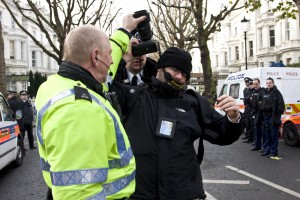
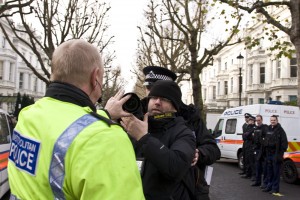
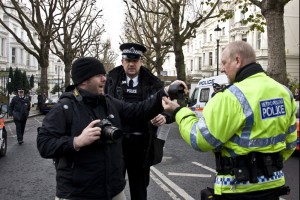
It’s for charidee: Carol concert (December 11) and Evening Standard’s eBay auction
It’s the season of good will, so here’s a plug for two worthy events:
In aid of Leonard Cheshire Disability, newsreaders Nicholas Owen, Emily Maitliss and Katie Derham will take part in a fundraising Christmas concert.
Music at the event, which will be held on Thursday December 11 at the Royal Festival Hall on London’s Southbank, will come from the London Chamber Orchestra, London Philharmonic Choir and stars of stage and screen.
Tickets are priced from £10-£50 and are available from the Southbank Centre on 0871 663 2500 or can be booked online.
Can’t make that? You can take part in the Evening Standard’s ebay auction from the comfort of your own desk (or lap, depending on what you use…):
To raise money for charity Greenhouse, the ES is auctioning off a host of meeja-related prizes from dinner with editor Veronica Wadley, lunch with Robert Peston to accompanying Sir David Frost to a screening of Frost/Nixon.
The auction closes at 12pm (GMT) on Monday 15 December, so get bidding: lunch with Andrew Gilligan is already up to £259.00 or you can get an audience with Brian Sewell for £101.00.
Independent: New journalism postgrad course at City University
An MA in political campaigning and reporting is the lastest offering from London’s City University, and the course will be headed by Ivor Gaber.
Inside the Guardian’s new newsroom
The Guardian has begun its move into new offices at Kings Place, London, today.
The images below, which are courtesy of Guardian Inside blogger Paul Carvill, show the inside of the new premises – for more, see Paul’s Flickr stream.
(Hopefully we’ll get invited for a nose around ourselves in not too long…)

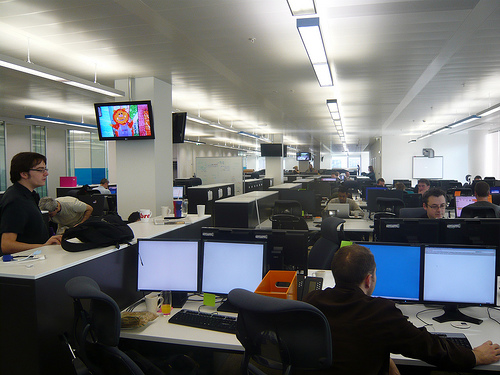
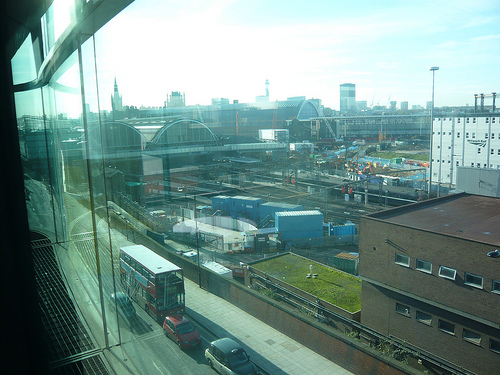

The famous Dutch Guitarist Jan Akkerman has released many albums of his own music.
Want to try your luck? Play for money in Starlight Princess on the official site!
New blog series: Mad to start freelancing in the recession?
Despite all that stuff about English degrees leading to flipping burgers, after leaving university I had the good fortune to run my own magazine with friends while temping at a local TV channel and then to work as deputy editor for a regional magazine. Since graduating, I’ve managed to hold down full-time editorial roles.
Until that is, I moved to London, did a maternity cover stint at my dream magazine – spent five months making contacts, gaining industry leeway and vital experience – only to find there were no permanant jobs going at the end of it.
Luckily for me, my most recent employers have been kind enough to give me shift work (a godsend if you can get it), which has given me the security to make a go of freelancing.
And so, just as the country entered recession and editorial budgets everywhere were cut, I have been thrown into the world of freelance journalism.
Suddenly I went from the safety of the office, its databases, reputation and regular income, to the forlorn makeshift study in the corner of my communal sitting room (because who has room for an office in London?). It was time to abandon Outlook for Twitter and to change from being the one receiving, commissioning and yes, I’ll sheepishly admit, occasionally ignoring freelance pitches, to the one doing the pitching.
In this blog I’ll chart my progress as I endeavour to make a living (albeit a meagre one) off my own back, the freelance way.
It won’t be so much of a ‘how to start out as a freelance’, but more of a collection of stories, anecdotes, and hopefully a forum for people in a similar boat to share ideas, advice and opinion. Welcome to the world of the newbie freelancer.
So as the invites from PRs for lunches turn miraculously into ‘I’ll be at that canapé reception – catch you then’ and the chill-inducing tone of commissioning editors everywhere sings out bluntly ‘never heard of you’ – I’ll be sharing it here, with you, along with (hopefully) the odd triumphant tale of why freelance is the way to go…
Rosie Birkett is a freelance journalist and sub-editor who specialises in food, hospitality and travel. She can be contacted on rosiebirkett1 at hotmail.com. She also blogs at thelondonword.com and at fiftyfourfoodmiles.wordpress.com. You can follow all Rosie’s freelance updates here.
MediaGuardian: London students dominate the Guardian Student Media Awards
Eight categories were won by London university students in this year’s Guardian Student Media Awards. Student journalist of the year went to Tom Roberts, the editor-in-chief of Felix, the student newspaper of Imperial College London.
‘What I’ve learned as a published author’ by Linda Jones
Yesterday Journalism.co.uk posted part one of Maria McCarthy’s guide to getting a book deal. Freelancer Linda Jones has already done just that, and here she shares ten ‘blindingly obvious things’ she has learnt in her first year as an author.
The post was originally posted on her blog at Freelancewritingtips.com. Get in touch with your own stories: judith at journalism.co.uk. Here’s what Linda learnt, following the publication of the Greatest Freelance Writing Tips in the World.
Sir Christopher Meyer’s speech in full: plea to publishers to aid PCC
As reported on the main page, Sir Christopher Meyer will tonight urge publications to support the Press Complaints Commission (PCC) in its role, which he emphasises is still relevant in light of online developments and recent privacy issues. Here is his speech in full, courtesy of the PCC’s website:
“It is always a pleasure to be in Manchester – a city with a vibrant media which I have visited more than any other in England during my time chairing the PCC. It was in this very room five years ago that I launched the first of our Open Days: public meetings in the towns and cities of the UK aimed at making the PCC as accessible as possible. Then, as now, we were given all possible support by the Manchester Evening News and Paul Horrocks. One of the most respected and innovative editors in Britain, Paul was also an outstanding member of the PCC for four years.
It has always been my ambition to hold a full meeting of the PCC outside London. It is vital to get over the message that we are not a body shut away inside a metropolitan bubble, dealing with the complaints of celebrities, royals (and near-royals), and politicians. The reality is far different. We exist for all the citizens of the United Kingdom; and of the thousands who come to us for help and advice, over 90 per cent lay no claim to celebrity whatsoever.
So, tomorrow’s meeting of the PCC is an historic moment in the 17-year life of our organisation. My colleagues from the board, all/most of whom are present tonight, are the people who take the decisions under the Code of Practice: about where the public interest meets the individual’s right to privacy; what constitutes a significant inaccuracy; when payments for information can be made – in short, on how the UK’s newspapers and magazines should gather and report news in print and online.